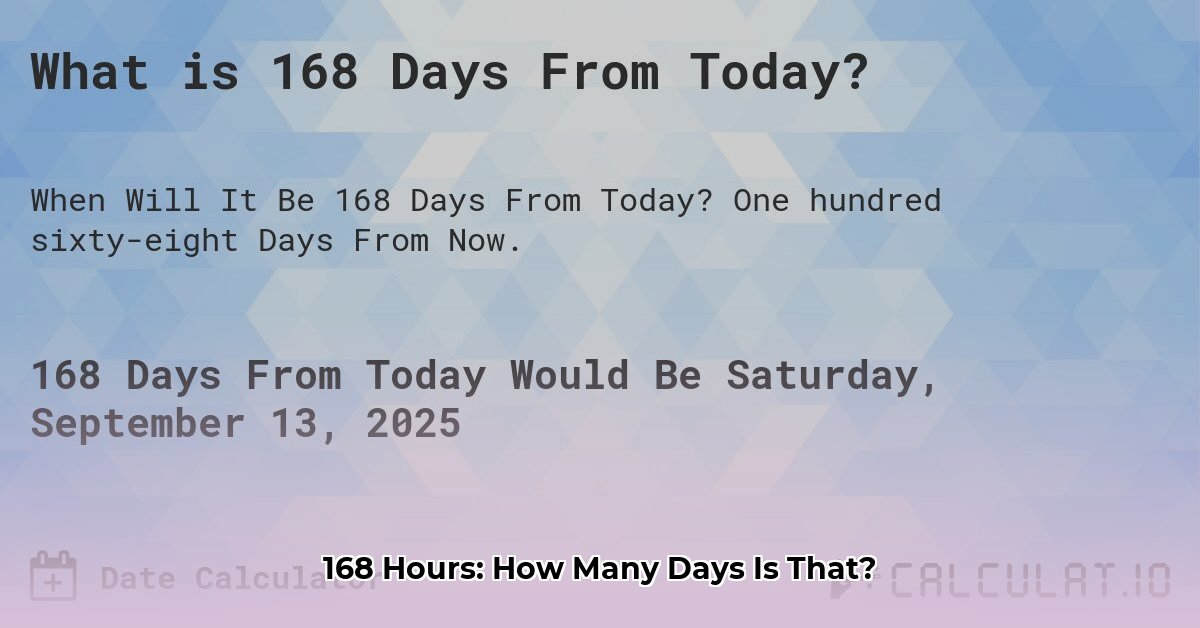168 hours is equal to 7 days.
Why 7 Days? The Calculation Explained
This is because there are 24 hours in a day. Dividing 168 by 24 gives you 7. Think of it like having 168 cookies and packaging them into boxes of 24. You’d fill exactly 7 boxes!
168 / 24 = 7
Breaking It Down: A Visual Guide
| Hours | Days |
|---|---|
| 24 | 1 |
| 48 | 2 |
| 72 | 3 |
| 96 | 4 |
| 120 | 5 |
| 144 | 6 |
| 168 | 7 |
Each row in the table shows how many full days are made up by a certain number of hours.
The 24-Hour Day: A Brief History
Why 24 hours? It’s likely connected to the Earth’s rotation, which takes roughly 24 hours. Ancient civilizations, like the Egyptians, probably used this natural cycle to divide the day. There’s ongoing research into the specifics of ancient timekeeping, so our understanding might evolve. It’s also important to remember that the actual rotation isn’t precisely 24 hours—it’s closer to 23 hours and 56 minutes. The extra four minutes account for the apparent movement of the Sun relative to distant stars. This is known as a solar day.
Real-World Applications: When is this Useful?
Knowing that 168 hours equals 7 days is surprisingly practical:
- Work Weeks: Calculating total work hours, especially with varying schedules.
- Project Planning: Estimating project timelines based on hours needed.
- Vacations: Planning your itinerary for a 7-day trip.
- Sleep Tracking: Calculating total sleep time over a week.
- Billing & Invoicing: Calculating billable hours based on daily rates.
Beyond Hours and Days: Exploring Other Time Conversions
Want to dive deeper into the world of time?
- Hours to Minutes: Multiply hours by 60 (168 hours x 60 minutes/hour = 10,080 minutes).
- Days to Weeks: Divide days by 7 (Example: 14 days / 7 days/week = 2 weeks).
- Weeks to Months: Approximately 4 weeks make a month (this varies slightly due to differing month lengths).
- Months to Years: 12 months constitute a year.
- Weeks in a Year: There are approximately 52 weeks in a year.
Understanding these conversions enables you to navigate time effectively, whether you’re scheduling your day, planning long-term projects, or simply curious about how we measure time.
Time Zones and the 168-Hour Week
Interestingly, time zones don’t affect the 168-hours-equals-7-days rule. Whether you’re in New York, London, or Tokyo, a week is still 168 hours long.
The Future of Time: Ongoing Research
Our current understanding of time is constantly being refined by ongoing research. For example, studies in fields like astronomy and physics—especially relativity and quantum mechanics—may impact how we perceive and measure time in the future. While our current models are very accurate for everyday life, future discoveries may reshape our fundamental understanding of this essential concept. It is also important note the Earth has a slight wobble in its rotation which changes the length of the solar day over time, albeit in a very gradual way. This is accounted for with the occasional “leap seconds” that are added to keep our clocks synchronized.
Daylight Variations
Finally, it’s important to remember that the length of daylight within a 24-hour period changes with the seasons and your location relative to the equator. This can affect how we experience the length of 168 hours, making a week feel longer or shorter depending on factors such as how much sunlight is available.
- Top Rated Meditation Books to Deepen Your Practice - February 5, 2026
- Good Mindfulness Books For A Calmer, Happier Everyday Life - February 4, 2026
- Recommended Meditation Books for Beginners and Experienced Practitioners - February 3, 2026
















